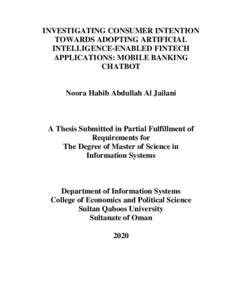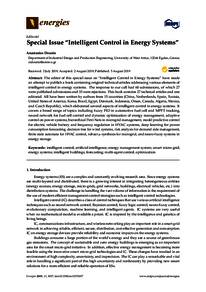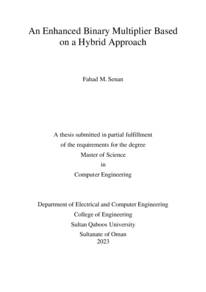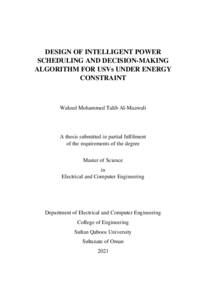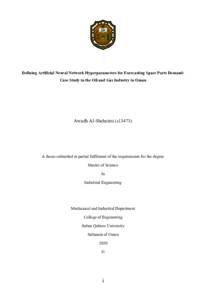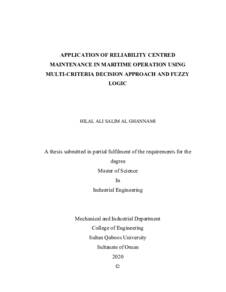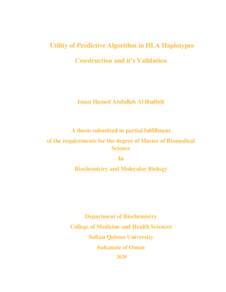Document
Investigating consumer intention towards adopting artificial Intelligence-enabled FinTech applications : Mobile Banking Chatbot.
Publisher
Sultan Qaboos University.
Gregorian
2020
Language
English
Subject
English abstract
This study aims to investigate the factors that influence consumers' intention to adopt
artificial intelligence mobile banking chatbots in Oman. A model was proposed through
the integration of Unified Theory of Acceptance and Use of Technology (UTAUT)
model with Technology Readiness Index (TRI) model along with another two external
factors. Nine hundred consumers from Oman participated in the process of data
collection using a quantitative approach (survey). Confirmatory Factor Analysis (CFA)
was used to perform the reliability and validity checks and a structural modeling was
employed to test the research model and hypotheses. The results reveal that 8 out of 9
factors were supported by the study model and one factor showed a non-significant
influence on the Behavioral Intention (BI) to adopt AI mobile banking chatbots.
Specifically, the factors that supported and influenced the consumers to adopt AI mobile
banking chatbots positively are: Effort Expectancy (EE), Innovativeness (IV) on Effort
Expectancy (EE), Innovativeness (IV) on Behavioral Intention (BI), Discomfort (DS) on
Effort Expectancy (EE), Discomfort (DS) on Behavioral Intention (BI), Insecurity (IN)
on Effort Expectancy (EE), Social influence (SI), Facilitating Conditions (FC),
Perceived Security (PS) and Government support (GS). The only factor that showed a
non-significant influence on Behavioral intention (BI) is Insecurity (IN), however, it
indirectly influenced Behavioral Intention (BI) through another construct in an indirect
way. This study will add knowledge to the field of mobile banking chatbots in terms of
future implementation since this is a new concept of automated customer service for the
banks in Oman.
Member of
Resource URL
Arabic abstract
تهدف هذه الدراسة إلى التحقق من العوامل التي تؤثرعلى المستهلكين لتبني برنامج الدردشة المصرفية عبر الهاتف المحمول بالذكاء الاصطناعي في سلطنة عمان. كما تم اقتراح نموذج من خلال دمج النظرية الموحدة للقبول واستخدام التكنولوجيا مع نظرية مؤشر الجاهزية التكنولوجية وكذلك عاملين خارجيين آخرين. استندت الدراسة على استطلاع باستخدام استبيان كأداة لجمع البيانات ووزعت على مجموعة 900 مشارك. حيث تم استخدام تحليل العوامل الموكدة لتقييم صحة ودقة نموذج القياس ، ثم تم استخدام النموذج الهيكلي لاختبار الفرضيات المقترحة، كما أظهرت النتائج أن 7 من أصل 8 عوامل كانت تتوافق في نموذج الدراسة و أظهرت عاملاً واحداً فقط غير مؤثر و غير مهم على النية السلوكية لاعتماد تبني هذا البرنامج، وعلى وجه التحديد العوامل المدعومة والتي أثرت بشكل إيجابي على المستهلكين لتبني برنامج الدردشة المصرفية عبر الهاتف المحمول بالذكاء الاصطناعي في سلطنة عمان هي: توقع الجهد، والابتكارعلى توقع الجهد ، والابتكارعلى النية السلوكية ، والانزعاج على توقع الجهد ، والانزعاج على النية السلوكية ، وانعدام الأمن على توقع الجهد ، والتأثير الاجتماعي ،و تسهيل الظروف ، والأمن المدرك و الدعم الحكومي. عليه فإن العامل الوحيد الذي يشير إلى وجود تأثير غير مهم على النية السلوكية هو انعدام الأمن وذلك قد يوثر بشكل غير مباشر بالنية السلوكية من خلال عامل أخر بطريقة غير مباشرة. و تقدم الدراسة مساهمة نظرية وعملية حول محاولة فهم محددات الاستعداد لتقبل برنامج الدردشة المصرفية عبر الهاتف المحمول بالذكاء الاصطناعي والتي قد تكون محط اهتمام المستهلكين، مقدمي الخدمة و البنوك، ويوفر النموذج المقترح توجيهاً يستفاد منه لتطبيق برنامج الدردشة المصرفية عبر الهاتف المحمول بالذكاء الاصطناعي في سلطنة عمان
Category
Theses and Dissertations

